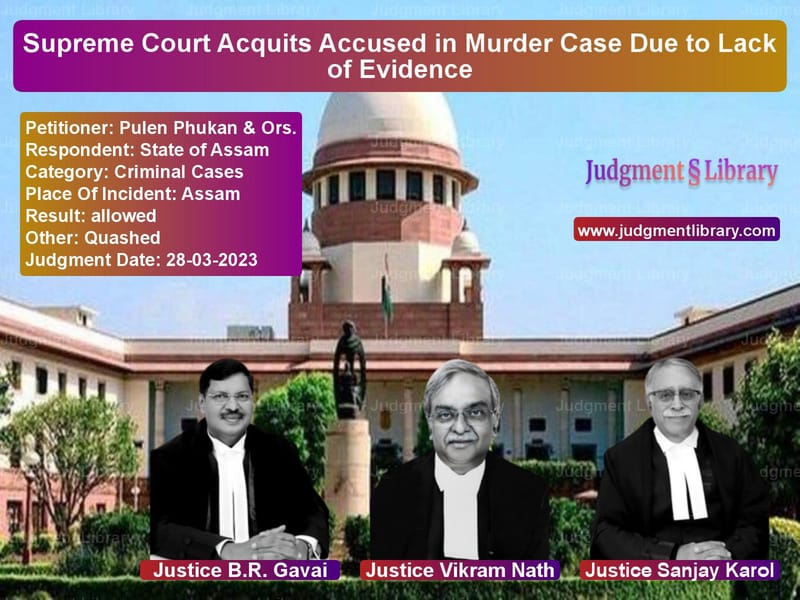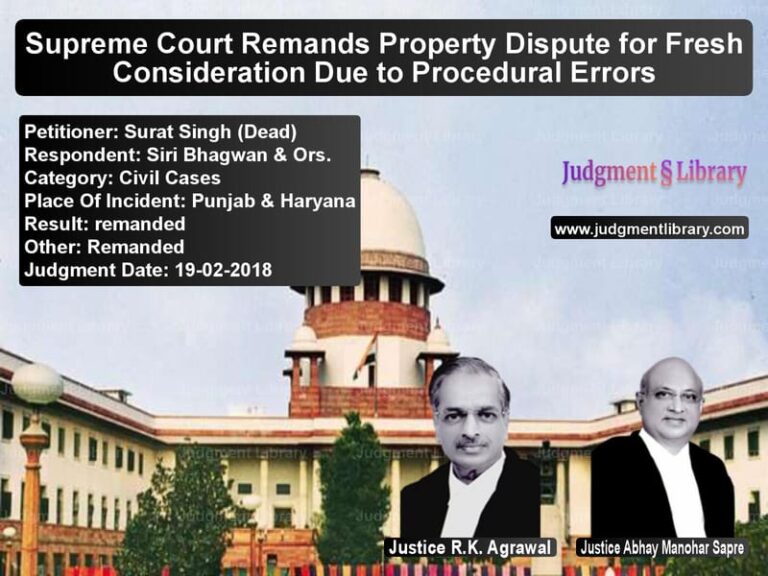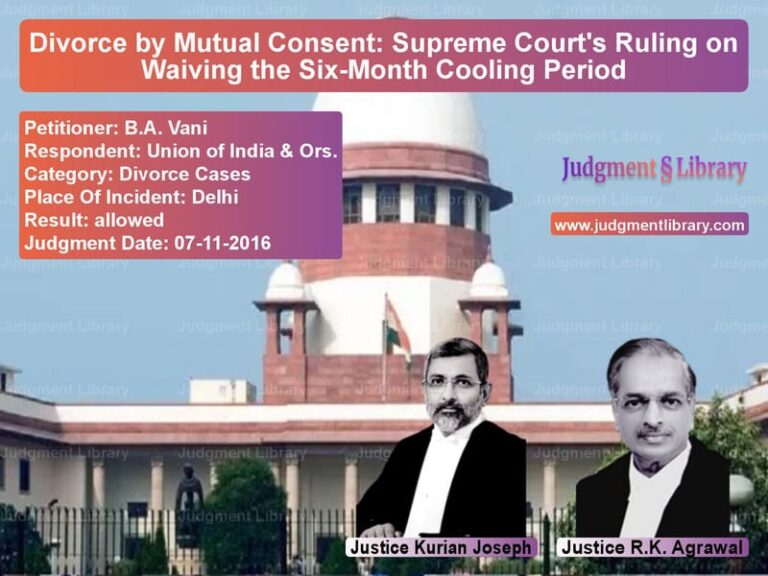Supreme Court Acquits Accused in Murder Case Due to Lack of Evidence
The case of Pulen Phukan & Ors. v. State of Assam involved an appeal against a conviction for murder and rioting. The Supreme Court had to determine whether the prosecution had proven its case beyond a reasonable doubt against the accused.
In its ruling, the Supreme Court overturned the conviction of the appellants, citing inconsistencies in witness statements, the unexplained presence of police officers at the scene, and the failure to produce key evidence. The judgment underscores the fundamental principle that criminal conviction must rest on clear and credible evidence.
Background of the Case
The case originated from an incident on June 13, 1989, in Chabua, Assam. The prosecution alleged that the appellants, along with several others, formed an unlawful assembly and committed the murder of one Pradip Phukan.
The First Information Report (FIR) was lodged by Smt. Nareswari Phukan (PW-1), who claimed that a group of thirteen people attacked her house, grievously injured her brother-in-law Robi Phukan (PW-2), and later killed Pradip Phukan using sharp weapons.
The trial resulted in the conviction of eleven individuals under Sections 147, 148, 447, 323, and 302 read with Section 149 of the Indian Penal Code (IPC). They were sentenced to life imprisonment. The Gauhati High Court upheld this conviction, prompting the appeal before the Supreme Court.
Arguments by the Parties
Arguments by the Appellants (Pulen Phukan & Others)
- The appellants argued that the FIR was vague and lacked specific details about the roles of individual accused persons.
- The presence of police personnel at the scene was not explained, raising doubts about the credibility of the prosecution’s case.
- Key witnesses, including PW-1, PW-2, and PW-3, provided contradictory statements that failed to establish a clear chain of events.
- No independent witnesses were examined, and no recovery of weapons was conducted at the instance of the accused.
- There was no medical evidence confirming injuries to PW-2, despite claims that he was assaulted.
Arguments by the Respondent (State of Assam)
- The prosecution maintained that multiple eyewitnesses had identified the accused as the perpetrators of the crime.
- The post-mortem report confirmed that the victim suffered multiple injuries caused by sharp weapons.
- The sequence of events as narrated by the prosecution witnesses was consistent and established the involvement of the accused.
- The trial court and the High Court had already scrutinized the evidence and found it sufficient for conviction.
Supreme Court’s Legal Analysis
Unexplained Presence of Police at the Crime Scene
The Court took serious note of the fact that police officers were allegedly present during the incident but did not intervene:
“The informant and multiple witnesses stated that police personnel accompanied the accused and stood outside the house while the crime was committed. No explanation was provided by the prosecution regarding their presence or why they did not act.”
Read also: https://judgmentlibrary.com/supreme-court-cancels-bail-of-drug-trafficking-kingpin-ajay-kumar-singh/
Contradictions in Witness Statements
The Supreme Court pointed out several inconsistencies in the statements of key prosecution witnesses:
- PW-1 initially stated that three accused persons committed the murder but later added more names.
- PW-2 claimed to have witnessed the assault but later admitted he was restrained by the police and could not see the crime.
- PW-3’s statement contradicted the FIR and other testimonies regarding the sequence of events.
Due to these inconsistencies, the Court ruled that the prosecution’s case lacked reliability.
Failure to Establish Common Object
The prosecution charged the accused under Section 149 IPC, which requires proof of an unlawful assembly with a common object. However, the Court found no evidence to establish such a common intent:
“None of the eyewitnesses stated that the accused shared a common object to commit murder. The presence of police officers further complicates this claim.”
Lack of Material Evidence
The Court also criticized the prosecution for failing to produce essential evidence:
- No blood-stained earth was collected from the crime scene.
- The axe allegedly used in the murder was never produced in court.
- Despite claims of injuries, no medical report confirmed the wounds sustained by PW-2.
Final Judgment by the Supreme Court
The Supreme Court ruled:
- The prosecution failed to prove its case beyond a reasonable doubt.
- The conviction and sentence imposed by the trial court and upheld by the High Court were set aside.
- The appellants were acquitted and ordered to be released immediately.
Impact of the Judgment
- Strengthens the Right to a Fair Trial: The ruling emphasizes that courts must scrutinize prosecution evidence carefully before convicting an accused.
- Prevents Misuse of Criminal Law: The judgment ensures that individuals are not convicted based on weak and contradictory evidence.
- Calls for Stronger Investigative Procedures: The decision highlights the need for thorough and impartial police investigations.
Conclusion
The Supreme Court’s ruling in Pulen Phukan & Ors. v. State of Assam upholds the principle that an accused person cannot be convicted unless their guilt is proven beyond a reasonable doubt. The judgment reinforces the importance of credible witness testimony, proper investigation, and adherence to due process in criminal trials.
Petitioner Name: Pulen Phukan & Ors..Respondent Name: State of Assam.Judgment By: Justice B.R. Gavai, Justice Vikram Nath, Justice Sanjay Karol.Place Of Incident: Assam.Judgment Date: 28-03-2023.
Don’t miss out on the full details! Download the complete judgment in PDF format below and gain valuable insights instantly!
Download Judgment: pulen-phukan-&-ors.-vs-state-of-assam-supreme-court-of-india-judgment-dated-28-03-2023.pdf
Directly Download Judgment: Directly download this Judgment
See all petitions in Murder Cases
See all petitions in Theft and Robbery Cases
See all petitions in Judgment by B R Gavai
See all petitions in Judgment by Vikram Nath
See all petitions in Judgment by Sanjay Karol
See all petitions in allowed
See all petitions in Quashed
See all petitions in supreme court of India judgments March 2023
See all petitions in 2023 judgments
See all posts in Criminal Cases Category
See all allowed petitions in Criminal Cases Category
See all Dismissed petitions in Criminal Cases Category
See all partially allowed petitions in Criminal Cases Category







